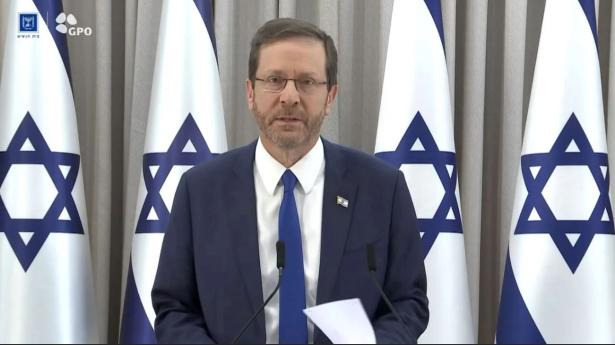Israeli President Isaac Herzog presented on Wednesday evening his compromise proposal as an alternative to the Netanyahu government's planned judicial overhaul, which the prime minister denounced as perpetuating the current situation.
According to Herzog's plan, the 'reasonableness' standard - which allows the High Court to override government decisions it deems 'unreasonable' will not be applicable to government decisions and ministerial appointments; the Supreme Court will not intervene into matters of Basic Laws; intervention into matters of regular laws will require an expanded forum of 11 judges and a two-thirds majority.
The plan also proposes a Judicial Appointments Committee that would be comprised of 11 members including three Supreme Court justices (among them the court's president); three cabinet ministers; three Knesset members – a coalition member and two opposition members; and two representatives of the public. The plan also calls for a supermajority of seven members to appoint Supreme Court justices. This means that the coalition would have a majority on the committee but would have to secure other support on the committee to obtain approval of its candidates for the Supreme Court.
Herzog said in his speech that "broad consensus is the right thing at this moment. Israeli democracy is the soul of our nation, and we must protect it at all costs." The president warned that "Whoever thinks real civil war, including bloodshed, is out of reach - has no idea. The abyss is within reach. A civil war is the red line. I will not let that happen."
Herzog stressed in his speech that structural changes are necessary and "in the best interest of the country," but that "a fundamental change in the relationship between government authorities must be done logically."
>> Netanyahu's judicial coup for dummies
The proposal, Herzog said, is intended to serve as a basis for an eventual alternative to the current judicial overhaul legislation, and that it paves the way for in depth debate on the issue.
"The proposal addresses the important need to diversify the judicial system," so that, according to Herzog, "the various voices of the people of Israel will be part of it."
Herzog added that his proposal "cements a fair and balanced relationship between the branches and is fully committed to the principles of the Declaration of Independence."
The coalition rejected Herzog's plan, with Prime Minister Benjamin Netanyahu denouncing the proposal, saying "key clauses in it only perpetuate the current situation. That is the unfortunate truth."
Government secretary Yossi Fuchs saying "The president's outline is unilateral," and that it has not been agreed upon "in any way by any party in the coalition."
Education Minister Yoav Kisch – speaking for the Likud party – said that parts of it "do not offer the minimal balance needed between the branches."
Opposition leader Yair Lapid said in a statement that he praises the president for his proposal and that we must approach it with "respect and seriousness," and that the "coalition's response to the proposal shows "contempt for the office of the president and complete irreverence for the gravity of the situation."
Head of the National Unity Party Benny Gantz also praised the proposal and the "effort he devotes to the unity of Israel," saying he accepts it as "a basis for legislation in place of the existing dangerous legislative proposal." Gantz called on Netanyahu and his government to "behave responsibly at this time and to adopt and promote the proposal immediately."
The American Jewish Committee issued a statement commending Herzog for his "remarkable effort to reach a resolution for the good of the Israeli people."
Leaders of the high-tech protest said in response to the proposal that "Even the president with all of his force and will cannot bring upon an agreement." They added that "although his proposal is worthy of consideration, the government continues in its race to dictatorship," and concluded by calling on Israelis to protest in Thursday's demonstrations.
Israel's Movement for Quality Government said that the proposal is a "serious base for debate on the judicial reforms and demands a full stop to the ongoing legislation." They acknowledged that the proposal is lacking in certain areas and that it's imperative to prevent any future ability of the Knesset to override the Supreme Court.
A Likud official told Haaretz ahead of Herzog's statement that there are still significant gaps until a compromise can be reached, mainly regarding the method of judicial appointments and the required majority to override the court. "Herzog is willing to validate many things, fearing that the compromise will collapse," the official said.
This is the second time that Herzog presented an alternative proposal to the government's judicial overhaul legislation. In his first proposal last month, the president suggested a change to the composition of the Judicial Appointments Committee, that four readings be required to pass a Basic Law, and that the process of judicial review on such laws be abolished.
On Tuesday, Herzog spoke with his German counterpart Frank-Walter Steinmeier about his efforts to formulate an alternative proposal to the government's plan to weaken Israel's judiciary. The conversation between the two presidents was scheduled in advance on the 80th anniversary of the Warsaw Ghetto uprising.
Last week, the president said he is willing to pay "any price" to resolve the growing tension surrounding the government's plans, describing it as "a national nightmare."


Spread the word